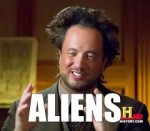Gary Farber listened to a very odd podcast — it’s all about how the atheists and Marxists conspired to take over science fiction. It’s hosted by a guy named Max Kolbe, who runs a blog titled Escaping Atheism: Because atheism is bullshit” (I guess his biases are obvious, at least), and he’s interviewing an author named Brian Niemeier, who is pleased to have been one of the Sad Puppies, so you know where he is coming from, too. Niemeier’s introduction to the interview is weirdly self-congratulatory and back-patting.
YouTuber Max Kolbe recently had me on his show to explain how the SJW convergence of tradpub science fiction happened. Max is particularly interested in the sudden shift from stories that took the Christian worldview for granted to overtly atheistic, anti-religious works. We discussed how John W. Campbell ended the reign of the pulps and how the Futurians fomented a Marxist revolution in SF publishing.
The episode garnered a lot of praise. Listen in and learn how sinister forces relegated the once-dominant SFF genre to a cultural ghetto.
Max himself is an unabashed sci-fi fan from way back, and I couldn’t help nodding along as he related how he drifted away from the genre about twenty years ago. He’d also been led to think of the post-1937 Campbell era as the “golden age” of SF and to regard everything that came before as trash.
The interview itself is a ghastly mangling of history with a great deal of lumping together of everything they dislike: notice how atheist, Marxist, and SJW are all used pretty much interchangeably?
Here’s the nonsensical premise of their discussion. There was a time in the past when science fiction was much more Christian, and readily embraced Christian themes. Then John Campbell abruptly forced all of science fiction to become atheist in 1937, and he was aided and abetted by a coalition of 50 godless liberal New York editors. The evidence for all of this is in an appendix in the AD&D Dungeon Masters Guide.
I don’t know what to say in the face of such an onslaught of bullshit.
There has always been a strain of irreverence in science fiction, and there have always been authors who explore novel ideas both in and out of the context of religion. Start with Mary Shelley’s Frankenstein; very irreligious, but exploring the roles of the creator and created. Is it an atheist book? Atheist-influenced, certainly, and written by a freethinker, but its relationship to religion is complicated. CS Lewis wrote science fiction. Tolkien was religious. Mary Doria Russell is an acclaimed, even by this atheist, author of books that have a strongly Catholic perspective. On the other hand, Isaac Asimov was an atheist…but religion is orthogonal to most of the stories he told (I must be a traitor to atheism to say that Russell is a far, far better writer than Asimov ever was). I’m sure a lot of contemporary SF authors are godless, but it would be tough to tell from reading their work. I simply do not see a pattern in the history of SF that would support a transition from religious to non-religious, or even that religious ideas are suppressed in contemporary work.
Ah, but you must look at their evidence. Here it is: Appendix N from the AD&D Dungeon Master’s Guide, published in 1979. It’s Gary Gygax’s personal reading list of science fiction and fantasy books that influenced him. According to Kolbe and Niemeier, this is a very spiritual list that if not openly Christian, takes Christianity for granted. WTF? These books?
Anderson, Poul: THREE HEARTS AND THREE LIONS; THE HIGH CRUSADE; THE BROKEN SWORD
Bellairs, John: THE FACE IN THE FROST
Brackett, Leigh
Brown, Frederic
Burroughs, Edgar Rice: “Pellucidar” series; Mars series; Venus series
Carter, Lin: “World’s End” series
de Camp, L. Sprague: LEST DARKNESS FALL; THE FALLIBLE FIEND; et al
de Camp & Pratt: “Harold Shea” series; THE CARNELIAN CUBE
Derleth, August
Dunsany, Lord
Farmer, P. J.: “The World of the Tiers” series; et al
Fox, Gardner: “Kothar” series; “Kyrik” series; et al
Howard, R. E.: “Conan” series
Lanier, Sterling: HIERO’S JOURNEY
Leiber, Fritz: “Fafhrd & Gray Mouser” series; et al
Lovecraft, H. P.
Merritt, A.: CREEP, SHADOW, CREEP; MOON POOL; DWELLERS IN THE MIRAGE; et al
Moorcock, Michael: STORMBRINGER; STEALER OF SOULS; “Hawkmoon” series (esp. the first three books)
Norton, Andre
Offutt, Andrew J.: editor of SWORDS AGAINST DARKNESS III
Pratt, Fletcher: BLUE STAR; et al
Saberhagen, Fred: CHANGELING EARTH; et al
St. Clair, Margaret: THE SHADOW PEOPLE; SIGN OF THE LABRYS
Tolkien, J. R. R.: THE HOBBIT; “Ring trilogy”
Vance, Jack: THE EYES OF THE OVERWORLD; THE DYING EARTH; et al
Weinbaum, Stanley
Wellman, Manley Wade
Williamson, Jack
Zelazny, Roger: JACK OF SHADOWS; “Amber” series; et al
Here’s the deal: if your story is a medieval European fantasy, like Anderson’s or Bellairs’, then yes, Christianity is taken for granted, usually. It’s part of the environment, like castles and swords and dragons. But the others…have they even read Burroughs or Howard? There ain’t no Christianity in them, but there is a lot of disrespect for priests and gods. Fritz Leiber’s books had magic and pagan deities and demigods that could be poked with a sword. Moorcock’s Elric stories are about a battle between the gods of chaos and law; he’s also the guy who wrote the obscenely blasphemous book, Behold the Man (which I recommend!). Manley Wade Wellman…sure, he was religious. He wrote stories built around Appalachian folk Christianity, also good stuff. I really don’t see a consistent religious or non-religious theme in this list.
Oh, and H.P. Lovecraft? This is your representative of spiritual Christianity in old SF? The interview waffles around the criteria, but eventually reveals that if a story features clear-cut good and evil, that’s enough to define it as spiritual and Christian-based. Apparently moral ambiguity and complexity are the vices the SJWs and Marxists have inflicted on genre fiction. Which sounds like praise, to me.
As for the “50 SJW editors” who control the SF publishing world from their citadel in New York, I don’t know. I can’t say that I have much familiarity with big name SF editors. What little I do know suggests that there’s more diversity than this conspiracy theory can tolerate. Jim Baen published a lot of stolid old school and military SF, stuff that the Sad and Rabid Puppies probably consider just fine, and the one true acceptable kind of science fiction. I’ve met Teresa and Patrick Nielsen-Hayden — they’re not atheists, but definitely on the progressive/liberal side of social issues. Maybe it’s just my lack of knowledge, but I’m just not seeing an atheist/Marxist/SJW cabal out there.
Maybe the real world is more ambiguous and complex than the crystal-clear distinction of good and evil that these Catholic fanatics imagine it to be.






